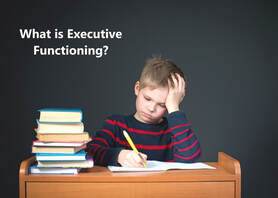 By: Madeline Kaleel Sometimes referred to as cognitive controls, executive functions are mental processes that allow for the control of behavior. These controls range from basic to higher order, with higher order executive functioning requiring the use of two or more of the basic skills. Basic executive functions include attentional control (concentration), inhibitory control (self-control), working memory, and cognitive flexibility. Higher order executive functions, such as planning, organization, and fluid intelligence, require an individual to use multiple basic executive functions simultaneously. Sometimes described as “the CEO of the brain”, these functions allow us to set goals, organize, self-monitor, and overall get things done. We aren’t born with these abilities, however. Executive functions are something that gradually develop and change over time, and they can be improved on at any point in your life. While growth in these areas typically comes about naturally through aging and experience, those with executive functioning issues may find one or more of these basic functions challenging. Executive functioning issues are not a diagnosis in and of itself, but it’s a common problem for those diagnosed with ADHD, a specific learning disability, or other learning and attention issues. So how can I tell if my child is struggling with executive functioning? Executive functioning issues present themselves different in each person. Kids may struggle with only one or two of the functions, while others may find all areas difficult. Similarly, different issues will present themselves at different points in life; the functions that a kid in elementary school struggles with are different than ones a high-schooler. Here are some possible signs that kids struggling with executive functioning may present:
My child shows one or more of these signs, how can I help? There are countless online resources and activities that you can use to help your child improve their executive functioning skills and succeed in life and school. It’s important to work with your child and learn which areas they need to focus on and what best helps them. If your child needs extra help, it could be beneficial to enroll them in courses or psycho-educational group to get more in-depth training and attention.
1 Comment
|
Archives
August 2021
Categories
All
|
 RSS Feed
RSS Feed